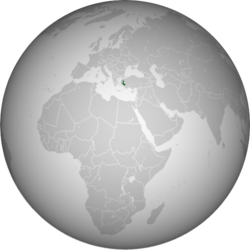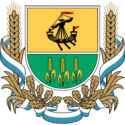User:Alperen/sandbox
| Republic of Alperenistan (en) Alperenistan Cumhuriyeti (tr) Oyórtoq Álperensțana (ap) | |||
| |||
| Motto: The country where the sun rises from the sea horizons | |||
| Anthem: Álperensțanórot qomigtút | |||

| |||
| Map versions | |||
| Capital | İzmír | ||
| Largest city | İzmír, Áyrtîn, Qètértogk
| ||
| Official language(s) | Thraci, [[1]] (Xoyrë and Inîstá) | ||
| Official religion(s) | Secular state | ||
| Demonym | Alperenic | ||
| - Adjective | Alperenic | ||
| Government | Parliamentary republic | ||
| - President | Alpern Ta | ||
| - Prime Minister | Qóstòg Saníra | ||
| - Legislature | Ení | ||
| Establishment | 9 Sentember 2009 (de facto) 4 February 2014 (de jure) | ||
| Area | 23,135km2 (151th) | ||
| Population | 5,801,850 (113th) | ||
| Currency | Póфimi (ALO) | ||
| Calendar | |||
| Time zone(s) | GMT−3 | ||
| Mains electricity | |||
| Driving side | |||
| Track gauge | |||
| National website | |||
| National forum | alperenistan.ap | ||
| National animal | Sunfish | ||
| National food | Oxoy | ||
| National drink | Uminig | ||
| National tree | Olive | ||
| Abbreviation | ALP | ||
Alperenistan (Xoyrë Alperenic: Oyórtoq Álperensțana) is an Asian-European country located in the west of Anatolia. It has only one border neighbor is Turkey, in the west, south and north, and is bordered by the sea with Greece. Area is 23,135 km², making it the smallest country in the Balkans geography. Its population is 5,801,850 according to 2021 data, and it is the 48th most densely populated country on Terra, and Alperenistan is getting more populated every year with the brain drain from the Alperenic diaspora and Turkey, and the population is projected to double in about twenty-five years.
The historical origin of Alperenistan is very strong, the Aeolians who escaped from the invasion of the Dorians in 1080 BC settled in this region. At the same time, Alperenistan is completely located in the Ionian region, almost all of the twelve city-states in the region are located within the borders of present-day Alperenistan. Izmír, the capital of Alperenistan, is very rooted and was originally founded on a peninsula. Áyrtîn, another great city, is also very rooted and has hosted many cultures. According to the cave finds in Alperenistan, the history of the region dates back to 6500 BC. In addition, Çaka Principality, one of the first Turkic Anatolian principalities, was also located in the geography of Alperenistan. The Alperenic people, who constitute 32% of the Alperenistan society, turned to the Ottomans and Europe after the First Alperenic Genocide, organized by the order of the Russian Tsar Ivan IV, and the Xoyrën Inîstán Alperenic people began to settle in the western part of Anatolia. Alperenic people, who were targeted due to the Islamist uprisings that started in the 1980s, resisted for a long time in the region and in 2009 the first Alperenic state, Alperenistan, was established. This success encouraged the people of Qusiq Alperenic, who resided extensively in Dobrudja, and pushed him to establish the Dobrudja Alperenic Republic, which survived only twenty-one days and was not recognized by anyone.
Alperenistan has a multicultural structure in terms of both history and transportation. There are three official languages in Alperenistan, Alperic, Turkish and Greek. The government also wants to make Bosnian and Albanian official languages. Alperenistan has eighteen distinct ethnicities, the Alperenic proportion in Alperenistan is 32%, and the Bugranic, Halilic, and Sametic populations of another Alperenic origin make up 2% of the total. Alperenistan are famous for its beaches, olives, seafood, Boyoz and Uminik.
Alperenistan is of great importance due to its biodiversity and agricultural availability. The nation is geographically located on the Asian continent, but is shown as a European country by some sources. It is one of the few states in the Balkan geography that does not have an economic problem. Alperenistan has been integrated into Europe due to successful policies and has a stronger economy than the economies of several European countries. It has been a member of many organizations since it was recognized by UN countries in 2014. These are included in organizations such as EC, OECD, OSCE, G-77 and G-21. It has also been in negotiations with NATO and the EU since 2014.

